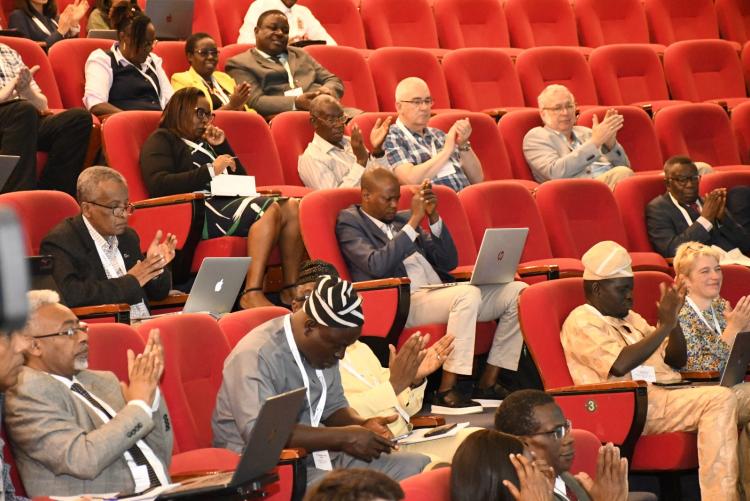The University of Nairobi hosted the 16th biennial Pan Africa Chemistry Network (PACN) Congress from October 29 to 31, 2024, bringing together leading scientists, researchers, policymakers, and stakeholders from across Africa and beyond. Celebrating its 16th anniversary, the PACN Congress underscored the ongoing commitment of the Royal Society of Chemistry (RSC) to support scientific development and capacity building on the continent. Since its establishment in 2008, PACN has invested over £2.5 million in African science, catalyzing partnerships with institutions like UON, governments, NGOs, corporations, and local organizations to promote sustainable development and advance the role of chemistry in addressing local and global challenges.
The congress highlighted PACN’s commitment, which has seen over £2.5 million invested in partnerships with governments, NGOs, and corporate bodies, creating a robust platform for scientific advancement, policy influence, and practical applications in the chemical sciences.
The official opening of the congress was presided by Eng. Laban Kiplagat representing Kenya’s Ministry of Agriculture and Livestock Development. Eng. Kiplagat highlighted the importance of chemistry in advancing agricultural sustainability. With this year’s PACN Congress theme centering on “Food and Agriculture,” Eng. Kiplagat, on behalf of Cabinet Secretary Dr. Andrew M. Karanja, stressed the role of chemistry in creating resilient agricultural practices. From soil health and crop nutrition to climate adaptation, innovations in chemistry are vital for achieving food security and strengthening Africa's agricultural systems in response to climate change. He also highlighted PACN’s enduring contributions to sustainable agriculture across Africa, referencing past congresses in Ghana and Ethiopia as key milestones in connecting science with practical agricultural solutions. Eng. Kiplagat’s call to action urged delegates to harness chemistry-driven innovations to confront Africa’s agricultural challenges while inviting international participants to experience Kenya’s cultural richness.
In his remarks,Ag. Deputy Vice-Chancellor RIE, Prof. Francis Mulaa, who represented the Vice-Chancellor Prof. Jesang Hutchinson., emphasized the University’s commitment to leveraging multidisciplinary research for real-world solutions. He highlighted the University’s sustained collaboration with RSC, which has significantly enriched the institution’s research capacity through access to journals, training programs, and valuable scientific equipment. Prof. Mulaa noted that this partnership fosters impactful research that informs policy and promotes sustainable development in Kenya and beyond, urging policymakers to prioritize research insights in shaping actionable policies for societal benefit.
Adding to the discussion, Prof. Leonida Kerubo, Dean Faculty of Science and Technology, noted the Faculty's longstanding support for PACN congresses. She praised PACN for offering invaluable training and collaboration opportunities for the University’s staff and students and proposed accrediting the NMR Training Centre within the Faculty to address the region’s skills gap in chemical instrumentation. Prof. Kerubo’s remarks highlighted the enduring partnership between PACN and the University of Nairobi, underscoring the Faculty's commitment to fostering scientific knowledge and collaboration for sustainable development.
Colin Sykes, Counsellor for Science, Innovation, Technology, and Digital at the British High Commission in Nairobi, highlighted the significance of partnerships in driving scientific progress. Representing the UK’s commitment to fostering equitable scientific exchange, Sykes emphasized that the congress provides a unique opportunity to deepen collaboration between African and UK scientific communities. He commended the University of Nairobi’s pivotal role in promoting science-led solutions and expressed gratitude for the contributions of the Deputy Vice-Chancellor and the event team in organizing this impactful gathering. With critical discussions centered around transitioning to green energy and achieving net-zero emissions, Sykes urged delegates to seize this platform to foster impactful partnerships and advance innovative solutions for global challenges.
The congress continued with a series of influential talks, including a keynote by Dame Clare Grey of the University of Cambridge, who discussed advancing battery technologies to mitigate degradation, a critical aspect of the global energy transition towards net-zero emissions. This session was followed by a diverse range of breakout sessions, each focusing on key themes such as energy, water, health, and environmental sustainability. Speakers from institutions across Africa, including South Africa’s University of Western Cape and Ghana’s Kwame Nkrumah University of Science and Technology, shared cutting-edge research on photovoltaics, sustainable bioenergy, and environmental protection.the congress also featured panel discussions on the open dissemination of knowledge across Africa, underscoring the need for equitable access to scientific information to catalyze development. Prominent scientists and policymakers discussed strategies to make scientific knowledge more accessible, advocating for a fully open-access future to drive transformative research and knowledge-sharing across the continent.
As the congress drew to a close, the University of Nairobi reaffirmed its commitment to championing scientific research that fuels Africa’s sustainable development goals. Delegates departed with renewed purpose and a shared vision for leveraging chemistry to address the continent’s most pressing challenges, from food security and water management to green energy and health solutions. The 2024 PACN Congress thus stands as a testament to the power of collaboration and the boundless potential of science to shape a sustainable and prosperous future for Africa.
- Log in to post comments

